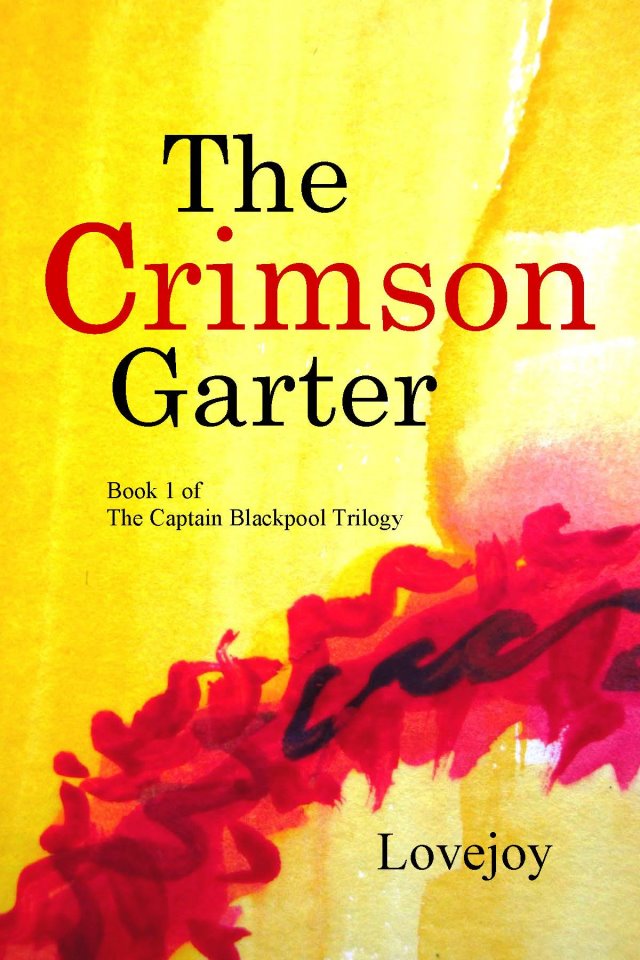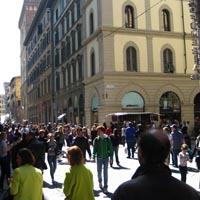
The truths have been revealed, and La Fragolina and the Count Kozlowski have departed together. Lucire travel editor Stanley Moss, writing pseudonymously as Lovejoy, concludes his novel, The Crimson Garter
Chapter 18
Letter from Humphrey, Earl of Pinckney
To Amanda Pennington-Smythe
Written from Prague
My Dear Miss Pennington-Smythe,
I am truly sorry my inattention of late has so distressed you, but I have been extremely taken with matters here, at the completion of my mission to which I alluded in earlier letters. Now the business is finished and I have accepted the invitation of the delightful Gertrud von Thyssen, Countess Kozlowski, who possesses a remarkable stable, and has entreated me to enter into a most compelling arrangement with her involving the sale of racing horses. I shall purchase property on the outskirts of Prague, where I may run my hounds and participate in the upcoming hunting season. Here I shall remain until the end of the year at the very least.
I regret I am unable to attend your sister’s birthday party next autumn, as I plan on being elsewhere at the time. Please accept my sincere wishes for your continuing good health and happiness.
Yours faithfully,
Humphrey, Earl of Pinckney
Daybreak over the Grand Canal in Venice, the sun glittering on the lagoon, illuminating its abundance of Renaissance and Moorish spires. The fabulous blues and reds, gold, turquoise and green blazed everywhere, mirrored in the dappled water. Pigeons, gulls and swallows played in the skies over the awakening city, where below a wealth of splendor could be easily observed through a single, tall, open window overlooking the canal.
The night before La Fragolina had performed to astonishing acclaim at the famed opera house of La Fenice. After the performance, her companion, the painter Balthazar, who was widely recognized as Count Kozlowski, had whisked her away from the stage door and they cruised by gondola through the moonlit canals, where they celebrated their passion and toasted their success. Not only had La Fragolina reinstated herself at the Paris Opéra, but the painter Balthazar was now notorious and sought-after, almost legendary. Their remarkable story had circulated everywhere, though an aura of mystery surrounded the months of La Fragolina’s absence, and not even the artist could account for the whereabouts of the celebrated painting which had once caused such a sensation. They had returned to the private dock of their luxurious palazzo on the Grand Canal, where he had fed her strawberries between kisses, and then they had slumbered on elegant linen sheets.
The first sound which Count Kozlowski heard when he awoke the next morning was the subtle lapping of waves. La Fragolina no longer slept next to him. He looked across the room towards an ornate settee, and found her there, framed by the lofty window which overlooked the canal, bathed in the morning glow. She was completely naked, except for the black ribbon, which she wore around her neck. He knew her better now, he could read her changeable moods, he had seen her temper. He knew her as a person, and not a mystery, though mostly he longed for the myth she once was to him. He found her notoriety oppressive, her reality too demanding, and he wanted his privacy back. But profound life change had cast them together and he would not let her go so easily. Too much had been sacrificed, too much had been gained.
In that moment his artistic eye again took over. All too perfect, he thought, memorizing the scene, hypnotized by the rhythmic billowing of the gauze curtains beside her. Impulsively he took up his notebook and began yet another drawing of her. A detail occurred to him, which he needed to add. Rising from the bed he walked across the cool marble floor to the gilded settee where she reclined, her thoughts far away, lost among the iridescent domes and rooftops which faded into the Adriatic sky all peach and purple and orange. He reached for her ankle and slipped over her elegant toes in one graceful and luxurious move a small object of red fabric, easing it up her silken thigh, where it came to rest. He knew, from her Byzantine eyes and the subtle suggestion which registered at the corners of her mouth, that while she acknowledged the playful gesture, her mind had again travelled to a distant place, somewhere in the future, where they could both reside with the memory of the past behind them, and where she could finally feel free. Her glance returned to the city that is called La Serenissima. Soon he would paint her again, he told himself, but the next time without the crimson garter. For the next canvas he would ask her to wear a replica of the pearls which had since captured the public imagination.
Kozlowski had learned how gossip worked. His own painting, The Crimson Garter, was gone, forgotten, disappeared without a clue, a faint memory in polite conversation. He assumed Captain Harry Blackpool had something to do with it, though he did not know what. The painting had been the only topic on people’s lips for a season. Then, true to the laws of gossip, it had faded from the popular mind as quickly as it had come to prominence. Kozlowski suspected that Misha had spirited the painting away, since Misha had gone missing after the grand ball, never to be heard from again. Now everyone talked about the pearls. Whoever bought them at auction had successfully eluded the public eye. Replicas of the legendary strand later flooded the market. Misha, the painting, the pearls, all removed from the face of the earth. Only one man could have had a hand in it: Harry.
As for the mysterious Captain Blackpool, the last which had been heard of him was hoofbeats outside the disreputable inn near Strasbourg. Some said he had returned to India. Others swore he had gone into the jungles of Africa in search of a legendary waterfall. One account put him living among savages in the American West. Kozlowski’s own opinion was that Harry Blackpool was circulating among them in disguise at this very moment, working his magic under their noses, undetected and unrecognized. In that presumption, Kozlowski was completely wrong. In actuality, Captain Blackpool had removed himself to a barge plying the Nile, protecting a huge horde of treasure acquired by the Fifth Maharajah of Jaipur, bound for the Indian Ocean. It was to be a simple mission for Blackpool, requiring him to ward off pirates and bandits and the usual array of brigands, a challenge he felt he could easily meet.
The first sign of a new development occurred to Cedric when Molly rushed into the pantry, announcing that Sir Robert Marsh had unexpectedly returned to Marshmoor from the Continent, arriving in a closed carriage driven by four fine horses. This uncharacteristic extravagance gave Cedric some trepidation, compounded by the fact that Sir Robert had obviously travelled back to Scotland alone. Lady Grace Marsh was nowhere in sight, and he spoke not a word about her. Downstairs among the servants a rumour had long circulated, while the master was abroad, that Lady Grace had run away in the company of a lowly artist, a presumption which Cedric tried hard to dispel, unsuccessfully. Many members of the staff remained convinced of the truth that a series of pornographic etchings implicating the Lady of Marshmoor were freely available in all the European capitals. The master’s behaviour once he was home, they agreed, validated it. Since Sir Robert maintained a silence about the matter, the staff thought it best never to mention her name, though they exchanged knowing glances behind his back, especially when he passed her now empty room, or absently handled some object attached to her memory.
Not long after Sir Robert’s return a strange crate arrived by wagon, with markings indicating it had been shipped from Strasbourg. It was a heavy, cumbersome object, larger than a spinet, and Sir Robert insisted it be promptly moved up to the East Wing, to a lonely room on the Southern tower where nobody ever went, to which he alone possessed the key. He became rather agitated as he supervised the burly workmen who hauled it down the musty halls, up the rickety staircases, and he appeared not to acknowledge the amount of effort it took them to drag it to the centre of the room, where he carefully watched them stand the crate upright, loosen the screws, but forbade them to open it any farther. He hustled everyone out of the chamber, locked the door with determination. Then he hurriedly paid the men and urged them to leave at once, glaring at the servants who waited at the bottom of the staircase. For many days he did not return to the room.
Some time later, on an especially dreary afternoon, Sir Robert Marsh, holding an old candelabra with three dripping candles, dismissed the staff early for the night, and walked the length of the house to the East wing, down damp halls, through dank corridors, up the creaky stairs, to the chilly room where the crate had lain. He looked back over his shoulders to be sure he had not been followed, unlocked the door with trembling hands. He placed the blazing candelabra on the floor in front of the crate, then locked the door tightly behind him. It occurred to him that the amount of money he had paid for this particular object would have seemed to him enormous at one time. Today it was only a pittance. He scowled at the recollection of the convoluted account the Earl of Pinckney furnished, something to do with a midnight rendezvous on a deserted road near the Alsatian border, preposterous intimations of grand intrigue, two masked highwaymen, the exchange of a chest of golden coins. He heaved the top of the crate aside, and it took him some time to remove the straw in which the object had been packed. What finally emerged was the enormous painting of the ship on a stormy sea, which had hung over the mantle in the tavern at the auberge outside of Strasbourg.
Sir Robert’s eyes came to rest on the shattered side of the frame where the pistol ball had lodged, and he experienced a moment of shame at the recollection of his rashness. From his vest pocket he removed a small knife, which he had brought for the occasion. He ran it along the edges of the lurid canvas, slitting it away from the frame, and in one grand gesture he tore it aside, revealing underneath the painting entitled The Crimson Garter. It startled him to look at it, he felt faint, nauseous. He moved the candelabra closer to the painting, stepped back, and once again cast his eyes on the thing which had cost him such a great deal of time, money and trouble. The painting revealed Grace to him as he had never envisioned her before, vibrant, in a state of wild nakedness, interrupted at an unconscious moment of repose. She had a look in her eyes that was foreign in its haughtiness, and for that reason it seemed sinister to him, taunting. There was a freedom and openness to her expression and posture which he had never seen, and barely understood. As he stared at the painting his left hand clenched and unclenched, and he stood facing it for several minutes, and he was not sure what he thought. He had once possessed this woman as his wife, but was it satisfaction or anger or disgust or regret that he now felt?
Captain Blackpool sat on the deck of the lonely barge, hidden in the inky shadows next to a massive crate. He looked out at the expanse of brilliant water, gratified to be miles from the wagging tongues of society. He had long ago determined where the painting landed—it could be nowhere else—but his involvement with it was over and done, he wanted nothing more to do with it or the ballerina. He alone knew who had acquired the pearls, for he had bade Vittorio Rosetti farewell with them at the docks of Calais. The pearls were bound for the New World, lodged in a secret compartment at the bottom of Rosetti’s sea trunk. If the ship reached Barbados, then the pearls would adorn the neck of a Creole beauty, a woman whose image Captain Blackpool had seen once on a painted miniature which Rosetti carried with him. Good for her, he thought. The secret was safe with him.
It was always the women, Captain Blackpool reflected, who made men do the things they do, paint paintings, buy extravagant pearls, fight wars. He himself had never surrendered his love for a noblewoman he knew once, many years ago in Amritsar. It was she against whom he measured all others since. He knew her precise location today, her status, and he had on occasion shadowed her from afar, invisibly protecting her from threats she would never know. He chose not to involve her in his world, they were of different stations, his life was always dangerous, she deserved to be kept safe from it. But as he stared at the shore his mind returned to her, as it always did, and he felt a magnificent longing. There would be no relief, this is what the universe had declared for him. His karma, his fate.
Years ago the high lama had repeated it to him: you go into the world to rescue others from their own folly. That is your destiny, Harry. That is how you will know yourself.
The End
Related articles hand-picked by our editors
 Two Parisian hideaways
Two Parisian hideaways
Stanley Moss looks at two distinctive Parisian hotels on opposite sides of town, with very different characters
photographs by Paula Sweet and courtesy Hôtel Le A
 Lucire’s
summer luxury travel special
Lucire’s
summer luxury travel special
There’s luxury—and then there’s luxury. Travel editor Stanley Moss has Lucire’s most comprehensive luxury
travel guide, with our picks in three locations:
• Skirting the upper atmosphere
in Firenze
• Undiscovered Rajasthan destinations
• Four small Paris hotels
photographed by the author
 A new Parisian island
of light and texture
A new Parisian island
of light and texture
Stanley Moss finds 7Eiffel, a Left Bank hotel that delights in
its use of light and texture, enriching visitors through experience, design
and excellent service
photographed by the author
Advertisement
Copyright ©1997–2022 by JY&A Media, part of Jack Yan & Associates. All rights reserved. JY&A terms and conditions and privacy policy apply to viewing this site. All prices in US dollars except where indicated. Contact us here.